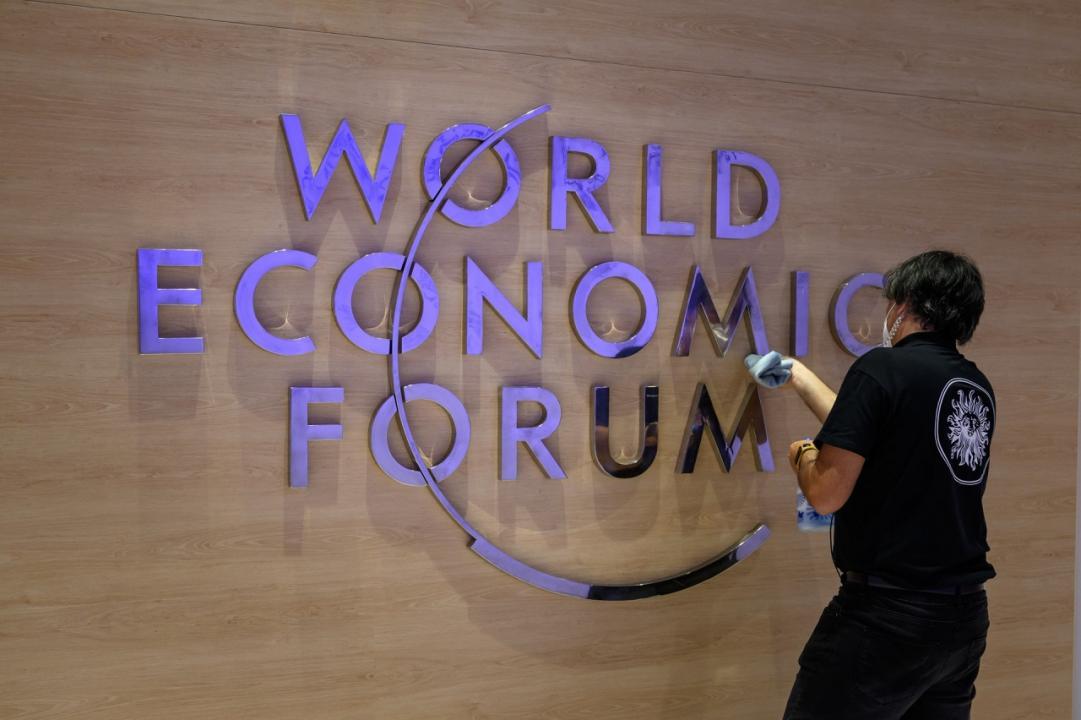Releasing its annual Global Risks report in London ahead of its Davos summit next week, the WEF also said geopolitical rivalries and inward-looking stances will heighten economic constraints and further exacerbate both short- and long-term risks

A worker cleans a sign of the logo of the World Economic Forum (WEF). Pic/AFP
The cost of living crisis is the biggest short-term risk the world is facing, while the failure of climate mitigation and climate adaptation is the largest long-term concern, the World Economic Forum said on Wednesday.
ADVERTISEMENT
Releasing its annual Global Risks report in London ahead of its Davos summit next week, the WEF also said geopolitical rivalries and inward-looking stances will heighten economic constraints and further exacerbate both short- and long-term risks.
The Global Risks 2023 report, drawing on views of over 1,200 experts, policy-makers and industry leaders from across the world, also urged countries to work together to avoid 'resource rivalries'.
"Conflict and geo-economic tensions have triggered a series of deeply interconnected global risks," the report said.
These include energy and food supply crunches, which are likely to persist for the next two years, and strong increases in the cost of living and debt servicing.
At the same time, these crises risk undermining efforts to tackle longer-term risks, notably those related to climate change, biodiversity and investment in human capital.
Also Read: WEF Davos summit to call on world leaders to address eco, energy, food crises
The report said the window for action on the most serious long-term threats is closing rapidly and concerted, collective action is needed before risks reach a tipping point.
Produced in partnership with Marsh McLennan and Zurich Insurance Group, the report painted a picture of the global risks landscape that is both new and eerily familiar, as the world faces many pre-existing risks that previously appeared to be receding.
Noting that the global pandemic and war in Europe have brought energy, inflation, food and security crises back to the fore, the report said these create follow-on risks that will dominate the next two years.
Those include the risk of recession; growing debt distress; a continued cost of living crisis; polarised societies enabled by disinformation and misinformation; a hiatus on rapid climate action; and zero-sum geo-economic warfare.
Failure to mitigate and adapt to climate change, natural disasters, biodiversity loss and environmental degradation represent five of the top 10 risks, with biodiversity loss seen as one of the most rapidly deteriorating global risks over the next decade.
In parallel, crises-driven leadership and geopolitical rivalries risk creating societal distress at an unprecedented level, as investments in health, education and economic development disappear, further eroding social cohesion.
Finally, rising rivalries risk not only growing geo-economic weaponisation but also remilitarisation, especially through new technologies and rogue actors, the WEF said.
This story has been sourced from a third party syndicated feed, agencies. Mid-day accepts no responsibility or liability for its dependability, trustworthiness, reliability and data of the text. Mid-day management/mid-day.com reserves the sole right to alter, delete or remove (without notice) the content in its absolute discretion for any reason whatsoever.
 Subscribe today by clicking the link and stay updated with the latest news!" Click here!
Subscribe today by clicking the link and stay updated with the latest news!" Click here!







